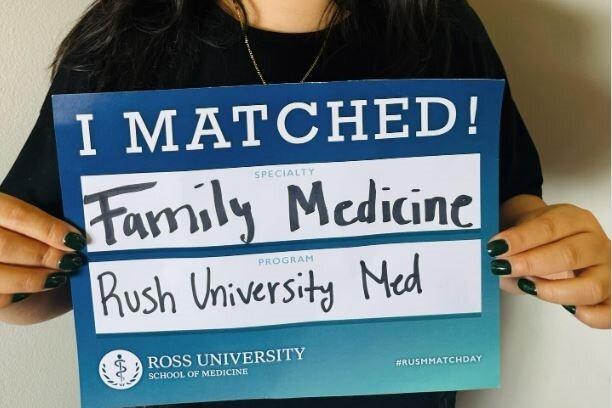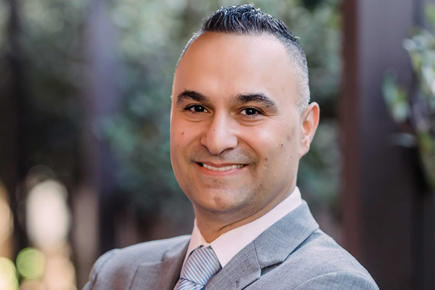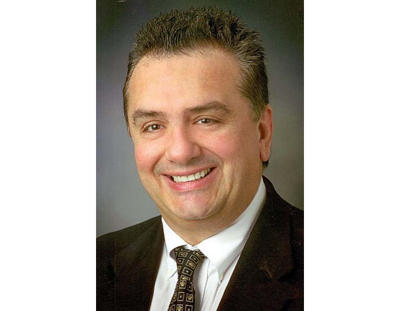In her work as an infectious disease specialist, Shuchi Pandya, MD ’12, has witnessed firsthand the amazing results of new HIV treatments, but notes that the stigma associated with the disease remains one of her patients’ toughest challenges and is something the United States – and the world as a whole – needs to strive to fully eradicate.
Shuchi’s desire to become a physician took root at a young age. Born and raised in India within a close, supportive family, she was first exposed to medicine when her brother was involved in a serious motorcycle accident that resulted in a shattered jaw. Instead of being frightened, Shuchi was fascinated by his recovery process – particularly the reconstruction of his jaw.
Over time, her fascination continued to grow and her aim to become a physician strengthened. She completed primary school in India in the top 99th percentile of her class only to be denied entry into her state medical school. Incensed by this, Shuchi’s father moved her entire family to Canada to allow her to continue to follow her dream. Once there, however, Shuchi was surprised to learn that she needed to go to University before she could even apply to medical school.
“It was totally different from the system in India and I didn’t know anything, but I figured it out,” she said. “I got into the University of Toronto and graduated with a degree in Human Biology, but then I got discouraged by some personal things in life and thought, oh my gosh, I can’t do this, I can’t do medicine, I’ve got to do something else.”
So, she took a job at the University bookstore. After less than a year, however, she realized she was not being true to her life’s calling. Not wanting to waste any more time, she started researching medical school options and Ross University School of Medicine (RUSM) quickly rose to the top of her list.
“There were two reasons I chose RUSM,” she explained. “The first was financial, and the second was Ross’s strong reputation, and I thought why not go to a school that is known for graduating excellent physicians? When I found out I got in I was super excited, and super nervous as well, but my experience was phenomenal.”
Shuchi credits RUSM for helping her learn independence as a female and as a physician.
“So much of what I learned still resonates,” she said. “RUSM taught me to keep aiming for the prize I wanted so badly, which was to graduate and do good as a physician. One of my greatest takeaways was learning how to have a good bedside manner. I can’t stress enough how much I learned at the hospital in Portsmouth. It made me appreciate everything that we have at our disposal – and so often take for granted.”
When it came time for Shuchi to enter the MATCH (the National Resident Matching Program®), she decided to apply for Internal Medicine residencies to give herself more options to specialize down the road.
“I didn’t know if I wanted to be a specialist or not, but I always had a liking for infectious diseases and I knew that applying to Internal Medicine would open doors,” she explained.
After being offered two pre-MATCH positions, she ended up choosing Trinitas Regional Medical Center at Seton Hall University in New Jersey.
“Trinitas was very multicultural and offered more pathology. My experience there made me stronger and taught me not to worry about handling 30 patients at one time. It was hard in the moment to be sure, but when I got to fellowship it was a total breeze because I had such excellent training. I wouldn’t have traded it for anything.”
In her second year of residency, Shuchi took an infectious disease elective that solidified her career trajectory.
“One day we had a horrible snowfall and I was the only one who showed up. And that’s when I truly realized the passion I have for this specialty. Other people [at the hospital] saw it, too, and to this day they are so proud of me and my decision to specialize in infectious diseases.”
Having discovered her focus, Shuchi began applying to fellowship programs across the country – 26 in all, many of which were in Florida because she and her husband had travelled there and fallen in love with South Florida.
“I ended up getting a bunch of interviews, but I’d ranked the University of South Florida as my top choice. The day that I found out I’d matched there was one of the happiest of my life,” she said.
Her exemplary performance led to her becoming Chief Fellow, but as the end of her fellowship began to approach, she realized there was one more major hurdle left to overcome.
As a Canadian citizen, Shuchi had undergone all of her training under a J1 exchange visa, only her time as a student was coming to an end and she needed to find an employer that was qualified to hire someone with her credentials.
At first the situation looked bleak, but luck favors the brave and Shuchi reached out to, and received the assistance she needed from, her current employer – the Infectious Disease Associates of Tampa Bay.
“I knew I was going to try everything in this world to get a job doing what I loved in Tampa, but I honestly thought I was going to go back. It was almost unimaginable,” she said, adding, “It is so amazing and makes me so emotional sometimes thinking about how far I have come. It was hard, but I would do it all over again. That’s the best part – you appreciate everything so much. RUSM was awesome. I feel really fulfilled. I achieved what I wanted to achieve, and of course, I’ll go for more.”
In her work, she notes that there has been tremendous progress in the fight against HIV/AIDS and that new drugs have made it possible for HIV-positive patients to have the same life span as someone without it.
“We have achieved so much in the area of HIV/AIDS, but where we still have work to do is in the area of education and eradicating the stigma that is still so pervasive. What I always do with my patients is shake their hands and tell them that it’s okay. You have a disease, but it’s treatable and preventable. And with luck, we aren’t far away from a cure. In the meantime, I would just say that we need to embrace it.”



